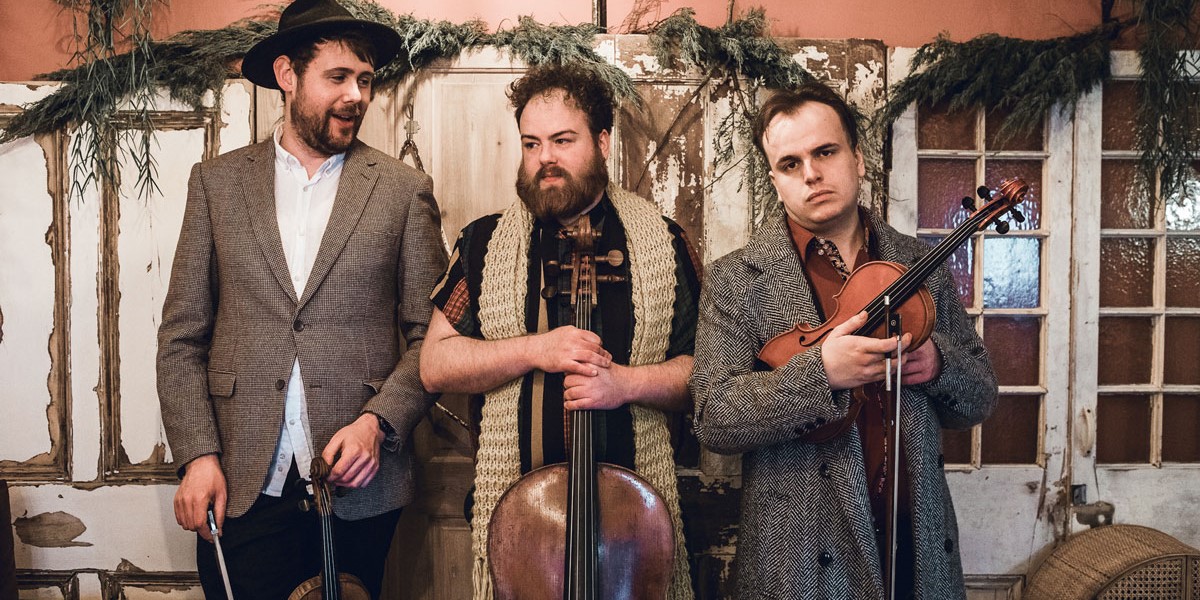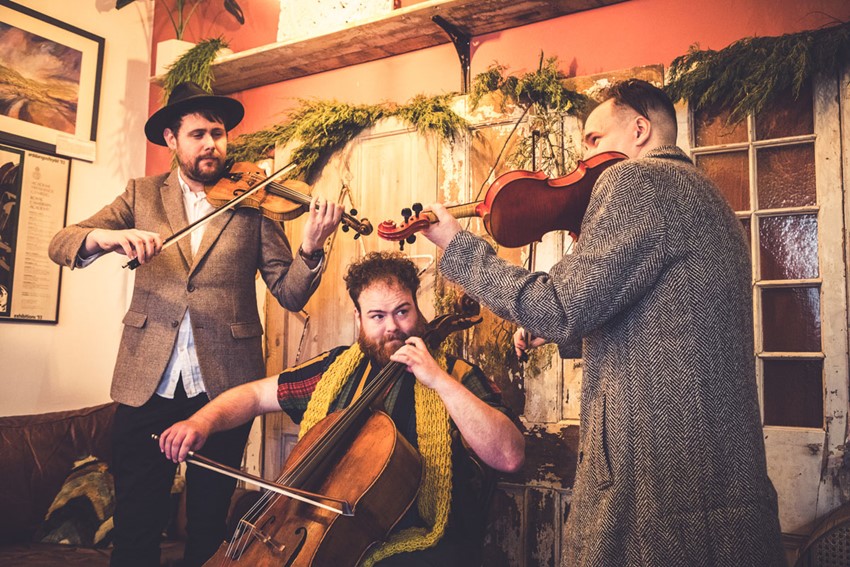Thursday, January 5, 2023
VRï interview: “Traditional music is owned by the people”
By Jo Frost
The Welsh trio VRï are injecting new life into traditional songs, mining the country’s past for the stories of everyday people

VRi (photo: Jennie Caldwell)
Wales may be tiny in size (population three million), but it has a mighty singing tradition. Whether it’s rugby fans belting out ‘Bread of Heaven’, hymn singing, choirs, the National Eisteddfod or Tom Jones, singing is an integral part of the national identity and the Welsh take great pride in being known as the Land of Song. But what is less well-known is its traditional music, and this is something that the trio VRï are intent on changing.
It’s no small coincidence that one of the titans of Welsh song, Sir Bryn Terfel, was instrumental in bringing the trio together in 2014. Viola and violin player Patrick Rimes was working as musical director on Terfel’s Christmas show; this particular one had a special folk focus. Rimes recruited the double-bassist and cellist Jordan Price Williams, who he’d met at the Royal Welsh College of Music, and the young fiddler Aneirin Jones to be part of the house band. Discovering their collective passion for folk music, they decided to form VRï.

VRi (photo: Jennie Caldwell)
Williams, who grew up playing classical music in orchestras, relished the experience of playing folk. “The main difference is traditional music is owned by the people. I’d never experienced such a musical freedom, to find a melody and some words and then the rest of the music didn’t exist until you created it. Also, the understanding that you’re dealing with your own national heritage is a huge thing.” This question of Welsh heritage and identity lies at the very heart of VRï’s music making.
The trio first made their mark in 2018 with their debut, Tŷ Ein Tadau. Their ‘chamber-folk’ aesthetic won them much acclaim and two Welsh Folk Awards. The follow-up album continues their exploration of Welsh traditional music and history, but with more emphasis on songs. “You get a story with a song, in the way you don’t with just a melody,” says Rimes. “So that was the main idea, to try and get a sense of people’s lives. It’s a lot easier to empathise with an idea when you’re dealing with an individual story, rather than a collective.” The songs describe the trials and tribulations of people – milk maids, plough boys, army recruits – who lived some two hundred years ago, but whose daily struggles echo those many experience today.
The title, Islais a Genir (A Sung Whisper), encapsulates the spirit of all the songs and it comes from a phrase used by guest singer Beth Celyn in the middle of one of her tracks (‘Y Cap o las Fawr’). Celyn’s beautifully warm clarion-like voice brings the stories of individuals from the past to life, seamlessly entwining spoken word with song, in English and Welsh. “All the old songs are kind of little snapshots,” explains Williams. “Somebody, somewhere put these words together with this melody and this is the only thing we have left of them. So it feels like this little voice coming across the centuries that, despite all the odds, this song, this person’s words are still here today although we know nothing else about them.”
Besides adding a new perspective to these stories, VRï’s aim, explains Jones in the sleeve notes, is ‘to build a new bridge between traditional music and the chapel-life’s torn relationship.’ The Methodist church and chapel life are inextricably linked to Welsh identity, culture and language, although Methodism also played a large role in suppressing Wales’ traditional music. Today there are around half-a-million people who speak Welsh, but historically the language and Welsh identity have endured a great deal of oppression.
In 1536 Henry VIII’s Act of Union deprived Wales of its official status and in 1847 the British government published a report on the state of Welsh education. Known as the ‘Blue Books,’ it was a scathing critique of the morals and behaviour of the Welsh and, Williams says, “it became part of the Welsh identity to have the strongest morals, in terms of general society and also in terms of religion.” This sparked the Methodist revival and a rebirth of pride and self-belief. Ironically, however, this period led to the decline of traditional music-making as puritanical Methodists frowned on the old Celtic ways of singing, dancing and fiddle playing. Harps and fiddles were hidden under floorboards, so gradually the old songs and tunes disappeared, except those repurposed as hymns. “There’s an expression still used today, rhoi’r ffidil yn y to, which is when you give up on something, literally you ‘put the fiddle in the roof,’ which would have been to make sure that it wasn’t burned in the Methodist purge,” says Rimes.
Thankfully, one community acted as important tradition bearers during this time: “There was quite a strong Roma population in North Wales who considered themselves outside of the society, so weren’t really affected by the diktats from the church,” says Rimes. The Roma continued to travel around the country playing Gypsy dance music on the harp, the instrument now synonymous with Wales.
In their own way, VRï are also tradition bearers who are defining a new Welsh sound. They’re injecting life into old songs, sharing the stories of their ancestors, while happily embracing other musical styles without the constraints of a long legacy of Welsh fiddle playing. They play – and sing – with the exuberance of a folk band, but possess the exquisite musicality and elegance of a chamber string ensemble. There’s a lightness and joy to their music, which is apt given that their band name comes from an old Welsh word, vrï. “It’s a catch-all word meaning ‘lifting’ or ‘levitating’,” Rimes explains. “We discovered early on how perilous it was to have no anchor instrument [drum kit or bass], so a lot of the time it feels like we’re three helium balloons zooming around, trying to keep some connection… it’s a risky business, but completely exhilarating, so the word vrï tries to capture that sense of danger and excitement.”
Read the review: Islais a Genir
This interview originally appeared in the December 2022 issue of Songlines magazine. Never miss an issue – subscribe today

